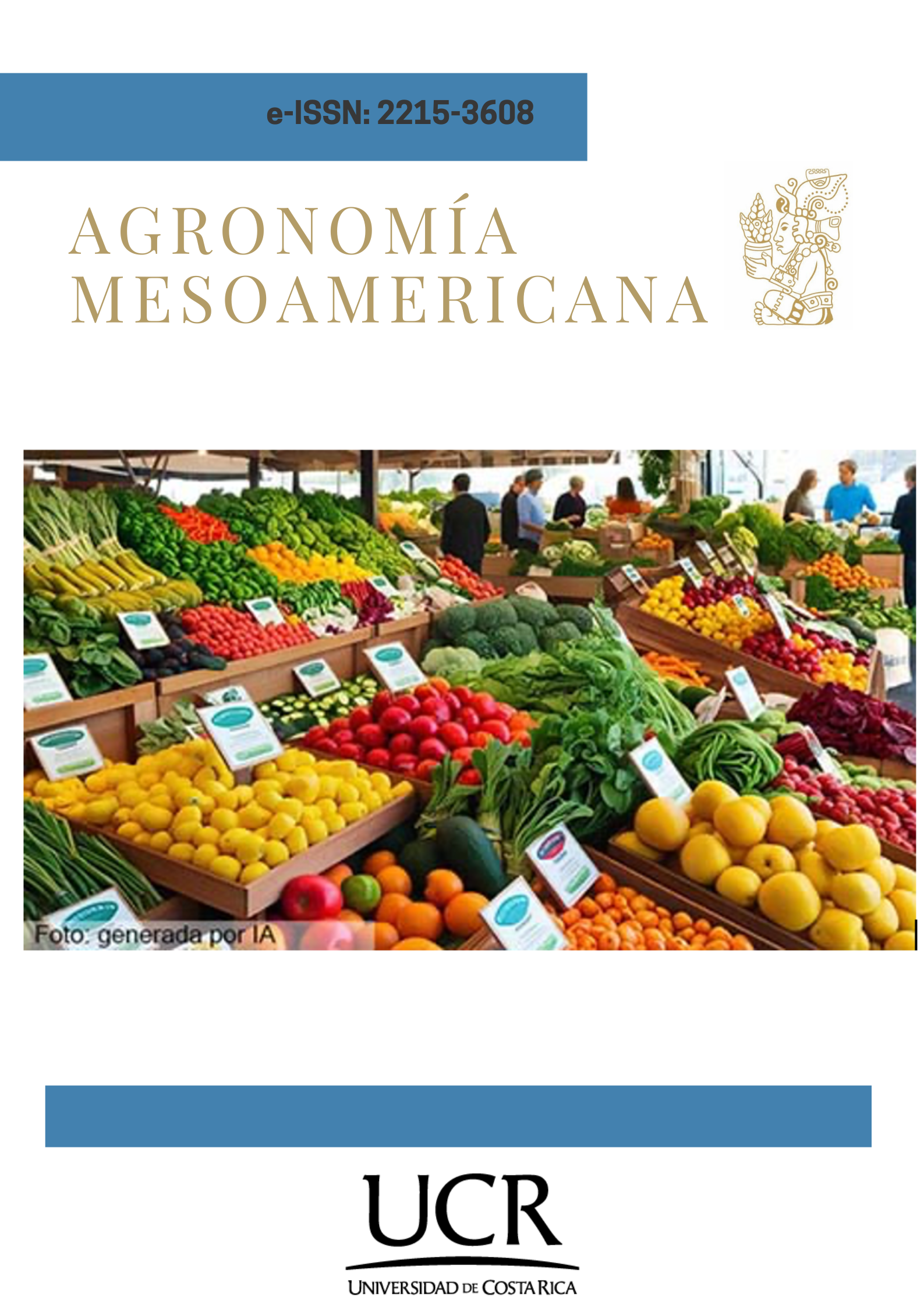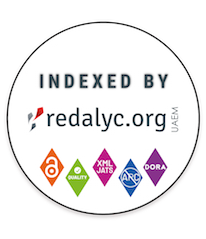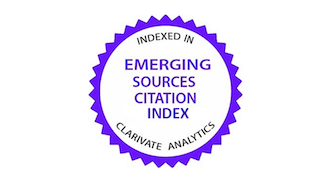Labeling, responsible and sustainable food consumption: Consumer perception in Costa Rica
DOI:
https://doi.org/10.15517/am.2024.57900Keywords:
Environmental sustainability, consumer survey, food labeling, consumer preferences, food consumption statisticsAbstract
Introduction. Over the last few decades, there has been growing interest on the part of consumers in sustainable agri-food products. As a result, voluntary standards have emerged as a tool to promote sustainability in production and consumption in agri-food value chains. Objective. To evaluate the profile of consumers and the degree of knowledge of sustainability seals for agricultural products in Costa Rican markets. Materials and methods. During October and November 2021, a nationwide virtual survey was conducted through the Qualtrics platform, from which 397 valid responses were collected. The sustainability seals considered were certifications of organic production, fair trade, denomination of origin, nation brand Essential Costa Rica, and carbon neutral. The Poisson regression model (PRM) was used to study the behavior of the variables, using Stata software version 16.0. Results. The Essential Costa Rica seal is the most recognized. People residing in the Greater Metropolitan Area (GAM) are more familiar with various seals. The income variable turned out to be a significant factor; those with higher incomes tend to identify and value sustainability seals more. The levels of knowledge and consumption of certified products increase when the consumer has some link to the agricultural sector. Conclusions. People’s interest in certified products is not reflected in their purchasing behavior, due in part to the price of the products, lack of trust or excessive information on labels. The findings of the study allow companies to define their marketing strategies according to the characteristics of the consumers of these differentiated products.
Downloads
References
Aboá, J., & Lees, N. (2020). Consumers use of quality cues for meat purchase: research trends and future pathways. Meat Science, 166, Article 108142. https://doi.org/10.1016/j.meatsci.2020.108142
Acevedo-Rojas, N. I., Dávalos-Flores, J. L., & Torres-Torres, F. (2015). Importancia de la calidad certificada de la leche bovina para consumidores del área metropolitana de la ciudad de México. Agrociencia, 49(1), 101–112.
Ahn, J., & Shamim, A. (2022). The role of consciousness in sustainable food consumption: a cultural comparison. Social Responsibility Journal, 19(7), 1263–1275. https://doi.org/10.1108/SRJ-04-2022-0177
Alonso, M. A. S., Abella, V. M., & Martínez, I. B. (2023). Sustainable food, key for the future of the planet: getting to know the European consumer of sustainable products. In J. A. Benítez-Andrades, P. García-Llamas, Á. Taboada, L. Estévez-Mauriz, & R. Baelo (Eds.), Global challenges for a sustainable society (pp. 124–138). Springer International Publishing. https://doi.org/10.1007/978-3-031-25840-4_16
Caso, G., Blasi, E., Cembalo, L., & Vecchio, R. (2023). This cookie will save the planet! The effect of a private sustainability claim on consumers’ expectations. Heliyon, 9(3), Article e14206. https://doi.org/10.1016/j.heliyon.2023.e14206
Cecchini, L., Torquati, B., & Chiorri, M. (2018). Sustainable agri-food products: a review of consumer preference studies through experimental economics. Agricultural Economics (Czech Republic), 64(12), 554–565. https://doi.org/10.17221/272/2017-AGRICECON
Chekol, F., Hiruy, M., Tsegaye, A., Mazengia, T., & Alimaw, Y. (2022). Consumers’ frequency of purchasing behavior of organic honey and butter foods from the farmers’ food product market in Northwest, Ethiopia: a poisson regression approach. Cogent Social Sciences, 8(1), Article 2144871. https://doi.org/10.1080/23311886.2022.2144871
Damico, A. B., Vecchio, Y., Masi, M., & Di Pasquale, J. (2023). Perceptions and attitudes of Argentine Zoomers towards sustainable food production. Foods, 12(5), Article 1019. https://doi.org/10.3390/foods12051019
De Andrade, A., Sodré, A., Efraim, P., & De Castilho, G. (2017). Impact of sustainability labeling in the perception of sensory quality and purchase intention of chocolate consumers. Journal of Cleaner Production, 141(10), 11–21. https://doi.org/10.1016/j.jclepro.2016.09.024
De Bauw, M., Franssens, S., & Vranken, L. (2022). Trading off environmental attributes in food consumption choices. Food Policy, 112, Article 102338. https://doi.org/10.1016/j.foodpol.2022.102338
De Marchi, E., Caputo, V., Nayga, R. M., & Banterle, A. (2016). Time preferences and food choices: evidence from a choice experiment. Food Policy, 62, 99–109. https://doi.org/10.1016/j.foodpol.2016.05.004
Dilas-Jiménez, J., Zapata-Ruiz, D., Arce-Almenara, M., Ascurra-Toro, D., & Mugruza-Vasallo, C. (2020). Análisis comparativo de los costos de producción y rentabilidad de los cafés especiales con certificación orgánica y sin certificación. South Sustainability, 1(2), Artículo e017. https://doi.org/10.21142/SS-0102-2020-017
Dong, X., & Jiang, B. (2022). The market effectiveness of regulatory certification for sustainable food supply: a conjoint analysis approach. Sustainable Production and Consumption, 34, 300–309. https://doi.org/10.1016/j.spc.2022.09.020
Geng, N., Liu, Z., Han, X., & Zhang, X. (2023). Influencing factors and group differences of urban consumers’ willingness to pay for low-carbon agricultural products in China. International Journal of Environmental Research and Public Health, 20, Article 358. https://doi.org/10.3390/ijerph20010358
GFK Emer Ad Hoc Research. (2016). Evolución de la caracterización de la tipología y perfil sociodemográfico del consumidor de alimentos ecológicos en España. https://www.mapa.gob.es/va/alimentacion/temas/produccion-eco/evoluciondelacaracterizacionyperfildelconsumidordeecologicosnov16_tcm39-379452.pdf
Gorton, M., Tocco, B., Yeh, C. H., & Hartmann, M. (2021). What determines consumers’ use of eco-labels? Taking a close look at label trust. Ecological Economics, 189, Article 107173. https://doi.org/10.1016/j.ecolecon.2021.107173
Greene, W. H. (2011). Econometric analysis. Financial Times Prentice Hall.
Grunert, K. G., Hieke, S., & Wills, J. (2014). Sustainability labels on food products: consumer motivation, understanding and use. Food Policy, 44, 177–189. https://doi.org/10.1016/j.foodpol.2013.12.001
Guntzburger, Y., Peignier, I., & De Marcellis-Warin, N. (2022). The consumers’ (mis)perceptions of ecolabels’ regulatory schemes for food products: insights from Canada. British Food Journal, 124(11), 3497–3521. https://doi.org/10.1108/BFJ-05-2021-0546
Hardin, J. W., & Hilbe, J. M. (2015). Regression models for count data from truncated distributions. The Stata Journal: Promoting Communications on Statistics and Stata, 15(1), 226–246. https://doi.org/10.1177/1536867X1501500114
Hasanzade, V., Elshiewy, O., & Toporowski, W. (2022). Is it just the distance? Consumer preference for geographical and social proximity of food production. Ecological Economics, 200, Article 107533. https://doi.org/10.1016/j.ecolecon.2022.107533
Iweala, S., & Sun, Y. (2022). The many aspects of voluntary sustainability governance: unpacking consumers’ support for tea standards in China and the UK. Cleaner and Responsible Consumption, 7, Article 100080. https://doi.org/10.1016/j.clrc.2022.100080
Jürkenbeck, K. (2023). The effect of information among established and new sustainability labelling on consumers’ preference and willingness to pay. Cleaner and Responsible Consumption, 10, Article 100131. https://doi.org/10.1016/j.clrc.2023.100131
Kini, J., Pouw, N., & Gupta, J. (2020). Organic vegetables demand in urban area using a count outcome model: case study of Burkina Faso. Agricultural and Food Economics, 8(1), Article 22. https://doi.org/10.1186/s40100-020-00166-0
Kranjac, M., Vapa-Tankosic, J., & Knezevic, M. (2017). Profile of organic food consumers. Ekonomika Poljoprivrede, 64(2), 497–514. https://doi.org/10.5937/ekopolj1702497k
Krishna, R., & Balasubramanian, P. (2018). The significance of factors influencing consumer behaviour towards organic food products in Kochi. International Journal of Pure and Applied Mathematics, 119(12), 2641–2664.
Loureiro, M., & Umberger, W. (2005). Assessing consumer preferences for country-of-origin labeling. Journal of Agricultural Applied Economics, 37(1), 49–63. https://doi.org/10.1017/S1074070800007094
Maulana, A., Toiba, H., Setiawan, B., Wahib, A., & Marendra, A. (2022). The application of choice experiments in a study on consumer preference for agri-food products: a literature review. Agricultural Economics, 68(5), 189–197. https://doi.org/10.17221/429/2021-AGRICECON
Nian, Y., Gao, Z., & Zhao, R. (2023). Are people’s daily life habits consistent with their preference for food sustainability labels? Agribusiness, 39, 589–622. https://doi.org/10.1002/agr.21803
Onozaka, Y., Honkanen, P., & Altintzoglou, T. (2023). Sustainability, perceived quality and country of origin of farmed salmon: impact on consumer choices in the USA, France and Japan. Food Policy, 117, Article 102452. https://doi.org/10.1016/j.foodpol.2023.102452
Organización de las Naciones Unidas para la Alimentación y la Agricultura. (2024, mayo 02). Agricultura orgánica. https://www.fao.org/organicag/oa-faq/oa-faq5/es/
Osawe, O. W., Grilli, G., & Curtis, J. (2023). Examining food preferences in the face of environmental pressures. Journal of Agriculture and Food Research, 11, 1–12. https://doi.org/10.1016/j.jafr.2022.100476
Piqueras-Fiszman, B., & Spence, C. (2015). Sensory expectations based on product-extrinsic food cues: an interdisciplinary review of the empirical evidence and theoretical accounts. Food Quality and Preference, 40, 165–179. https://doi.org/10.1016/j.foodqual.2014.09.013
Polimeni, J., Iourgulescu, R., & Mihnea, A. (2018). Understanding consumer motivations for buying sustainable agricultural products at Romanian farmers markets. Journal of Cleaner Production, 184(20), 586–597. https://doi.org/10.1016/j.jclepro.2018.02.241
Potter, C., Bastounis, A., Hartmann-Boyce, J., Stewart, C., Frie, K., Tudor, K., Bianchi, F., Cartwright, E., Cook, B., Rayner, M., & Jebb, S. A. (2021). The effects of environmental sustainability labels on selection, purchase, and consumption of food and drink products: a systematic review. Environment and Behavior, 53(8), 891–925. https://doi.org/10.1177/0013916521995473
Prada, M., Garrido, M. V., & Rodrigues, D. (2017). Lost in processing? Perceived healthfulness, taste and caloric content of whole and processed organic food. Appetite, 114, 175–186. https://doi.org/10.1016/j.appet.2017.03.031
R Core Team. (2019). R: A language and environment for statistical computing (3.6.1). R Foundation for Statistical Computing. https://www.r-project.org/
Rondoni, A., Millan, E., & Asioli, D. (2021). Consumers’ preferences for intrinsic and extrinsic product attributes of plant-based eggs: an exploratory study in the United Kingdom and Italy. British Food Journal, 123(11), 3704–3725. https://doi.org/10.1108/BFJ-11-2020-1054
Rosales Moya, M. F., Gomez Castillo, D., & Ruiz Zapata, A. (2022). Sellos y signos distintivos de calidad en las exportaciones del sector agropecuario costarricense. E-Agronegocios, 8(2), 65–88. https://doi.org/10.18845/ea.v8i2.6145
Sánchez-Bravo, P., Chambers, E., Noguera-Artiaga, L., Sendra, E., & Carbonell-Barrachina, A. (2021). Consumer understanding of sustainability concept in agricultural products. Food Quality and Preference, 89, Article 108142. https://doi.org/10.1016/j.foodqual.2020.104136
Sanz, J., & Macías, A. (2005). Quality certification, institutions and innovation in local agro-food systems: protected designations of origin of olive oil in Spain. Journal of Rural Studies, 21(4), 475–486. https://doi.org/10.1016/j.jrurstud.2005.10.001
Selvaggi, R., Zarbà, C., Pappalardo, G., Pecorino, B., & Chinnici, G. (2023). Italian consumers’ awareness, preferences and attitudes about Sicilian blood oranges (Arancia Rossa di Sicilia PGI). Journal of Agriculture and Food Research, 11, Article 100486. https://doi.org/10.1016/j.jafr.2022.100486
Shamim, K., Ahmad, S., & Alam, M. A. (2021). COVID-19 health safety practices: influence on grocery shopping behavior. Journal of Public Affairs, 21(4), Article e2624. https://doi.org/10.1002/pa.2624
Shang-Ho, Y., Pebriyani, B., Kiyokazu, U., Johg-Wen, W., & Chen, D. (2021). Comparison of food values for consumers’ preferences on imported fruits and vegetables within Japan, Taiwan, and Indonesia. Food Quality and Preference, 87, Article 104042. https://doi.org/10.1016/j.foodqual.2020.104042
Starr, A., Adrián, T., Benepe, C., Auld, G., Lamm, D., Smith, K., & Wilken, K. (2003). Sustaining local agriculture: barriers and opportunities to direct marketing between farms and restaurants in Colorado. Agriculture and Human Values, 20, 301–321. https://doi.org/10.1023/A:1026169122326
StataCorp. (2019). Stata Statistical Sofware (Realese 16). StataCorp LLC.
Steiner, B. E., Peschel, A. O., & Grebitus, C. (2017). Multi-product category choices labeled for ecological footprints: exploring psychographics and evolved psychological biases for characterizing latent consumer classes. Ecological Economics, 140, 251–264. https://doi.org/10.1016/j.ecolecon.2017.05.009
Struwig, M., & Adendorff, C. (2018). Consumers’ perception of eco-labels in South Africa. Athens Journal of Business & Economics, 4(2), 163–178. https://doi.org/10.30958/ajbe.4.2.3
Szabo, S., & Webster, J. (2021). Perceived greenwashing: the effects of green marketing on environmental and product perceptions. Journal of Business Ethics, 171(4), 719–739. https://doi.org/10.1007/s10551-020-04461-0
Torelli, R. (2022). Greenwashing. In R. Brinkmann (Ed.), The palgrave handbook of global sustainability (pp. 1–11). Palgrave Macmillan, Cham. https://doi.org/10.1007/978-3-030-38948-2_108-1
Torelli, R., Balluchi, F., & Lazzini, A. (2020). Greenwashing and environmental communication: effects on stakeholders’ perceptions. Business Strategy and the Environment, 29(2), 407–421. https://doi.org/10.1002/bse.2373
Truong, V. A., Lang, B., & Conroy, D. M. (2022). When food governance matters to consumer food choice: consumer perception of and preference for food quality certifications. Appetite, 168, Article 105688. https://doi.org/10.1016/j.appet.2021.105688
Van der Ven, H. (2019). Beyond greenwash: explaining credibility in transnational eco-labeling. Oxford University Press.
Villalobos Monge, A. (2022). Compra por comercio electrónico de alimentos en Costa Rica durante el COVID-19. Agronomía Mesoamericana, 34(1), Articulo 50438. https://doi.org/10.15517/am.v34i1.50438
Vittersø, G., & Tangeland, T. (2015). The role of consumers in transitions towards sustainable food consumption. The case of organic food in Norway. Journal of Cleaner Production, 92, 91–99. https://doi.org/10.1016/j.jclepro.2014.12.055
Wahyudi, A., Kuwornu, J. K. M., Gunawan, E., Datta, A., & Nguyen, L. T. (2019). Factors influencing the frequency of consumers’ purchases of locally-produced rice in Indonesia: a Poisson regression analysis. Agriculture, 9(6), Article 117. https://doi.org/10.3390/agriculture9060117
Watanabe, E. A. de M., Alfinito, S., & Barbirato, L. L. (2021). Certification label and fresh organic produce category in an emerging country: an experimental study on consumer trust and purchase intention. British Food Journal, 123(6), 2258–2271. https://doi.org/10.1108/BFJ-09-2020-0808
Wu, Y. (2018). Empirical analysis of factors influencing consumers› satisfaction in online shopping agricultural products in China. Journal of Electronic Commerce in Organizations, 16(3), 64–77. https://doi.org/10.4018/JECO.2018070106
Yin, S., Chen, M., Chen, Y., Xu, Y., Zou, Z., & Wang, Y. (2016). Consumer trust in organic milk of different brands: the role of Chinese organic label. British Food Journal, 118(7), 1769–1782. https://doi.org/10.1108/BFJ-11-2015-0449
Yue, C., Lai, Y., Wang, J., & Mitchell, P. (2020). Consumer preferences for sustainable product attributes and farm program features. Sustainability, 12(18), Article 7388. https://doi.org/10.3390/su12187388

Downloads
Additional Files
Published
How to Cite
Issue
Section
License
Copyright (c) 2024 David Gómez Castillo, Luz Barrantes Aguilar, Yuliana Quesada Quesada

This work is licensed under a Creative Commons Attribution-NonCommercial-NoDerivatives 4.0 International License.
1. Proposed policy for open access journals
Authors who publish in this journal accept the following conditions:
a. Authors retain the copyright and assign to the journal the right to the first publication, with the work registered under the attribution, non-commercial and no-derivative license from Creative Commons, which allows third parties to use what has been published as long as they mention the authorship of the work and upon first publication in this journal, the work may not be used for commercial purposes and the publications may not be used to remix, transform or create another work.
b. Authors may enter into additional independent contractual arrangements for the non-exclusive distribution of the version of the article published in this journal (e.g., including it in an institutional repository or publishing it in a book) provided that they clearly indicate that the work was first published in this journal.
c. Authors are permitted and encouraged to publish their work on the Internet (e.g. on institutional or personal pages) before and during the review and publication process, as it may lead to productive exchanges and faster and wider dissemination of published work (see The Effect of Open Access).























